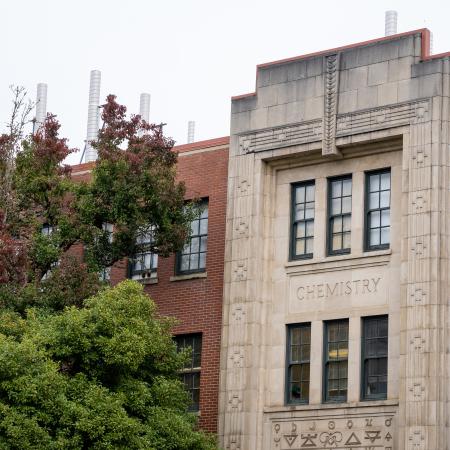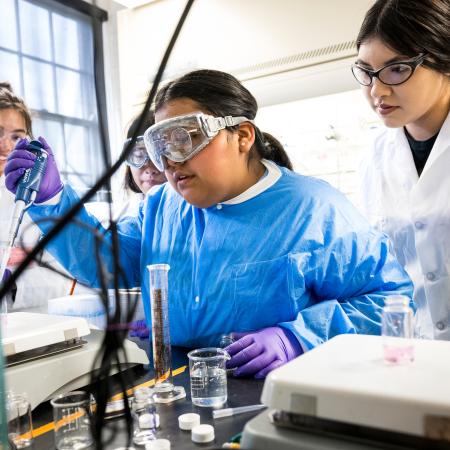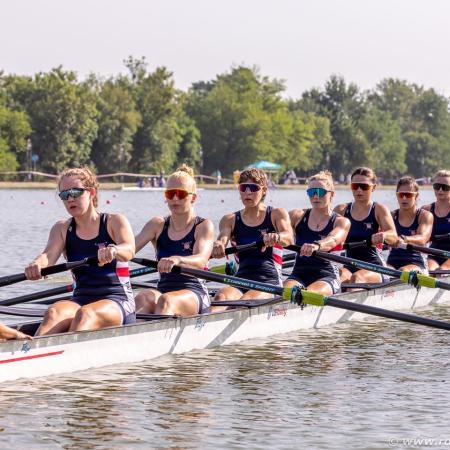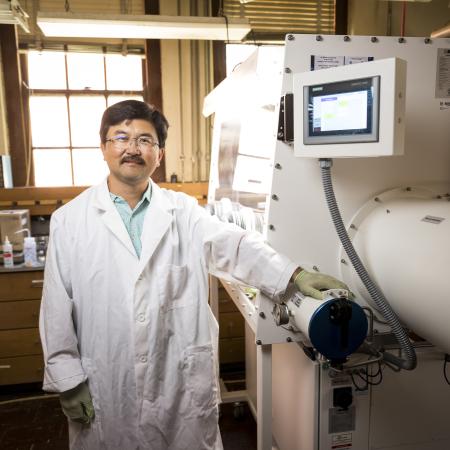As part of its commitment to graduate education, the Department of Chemistry offers an advanced program to its graduate students for the development of teaching skills.
Objectives
The intent of this program is to acquaint graduate students in chemistry with the practice of creating and operating a high-quality, college-level chemistry course. Its principal feature is the pairing of a graduate student (a student faculty associate) with a department faculty member in the teaching of a regular department course. The goal is to help the associate become an effective chemistry instructor, and in so doing to increase the likelihood that the associate will compete successfully for a college-level teaching position.
Participation
Graduate students participating in the program will be designated as student faculty associates. The department will attempt to include all interested students in the program, but each associate should meet the following criteria:
- Be making satisfactory progress toward a Ph.D. or M.S. degree.
- Be within two years of expected completion of degree work. Interest in the program should be made known to the program coordinator at the earliest possible time, however.
- Have a strong commitment to initiating a career that involves college-level instruction in chemistry, as evidenced by a positive record of teaching accomplishments, including evaluations by students and by faculty members for whom the student has served as a graduate teaching assistant.
- Devote several hours per week to the course during the term it is offered and to become involved in the course planning phase in the term prior to that in which the course is offered. All hours spent in the Mentor Program are understood to be on a volunteer basis. Since grading and tutoring are normal parts of a regular faculty member's duties, the associate is expected to share in these responsibilities as part of the learning experience. However, it is not the intent of the program that a graduate associate replace a teaching assistant, or to serve in the capacity of a teaching assistant.
Mentors
Faculty members who participate in the program are expected to have demonstrated a commitment to high-quality instruction in chemistry. The mentor is expected to involve the associate in all aspects of course planning and delivery. Included in these activities is lecturing, where appropriate to the course, by the associate. Normally the mentor will attend lectures given by the associate.
Program content
Co-instruction in a chemistry course
The associate and the faculty mentor work as co-instructors in a regular departmental course. To the fullest extent possible, the associate will play some role in each of the following:
- Text selection
- Syllabus preparation
- Creating course structure, including problems assigned, frequency and type of exams, laboratory experiments selected or created, and the weighting of factors that determine the course grade.
- Lecturing, or other interactive class time activities. Normally the associate will give two or three lectures during the term, with the mentor in attendance.
- Grading of exams, problem sets, reports, and projects. The function of the associate is to work on grading criteria and to spend sufficient time grading to experience the process from a faculty point of view. The associate should volunteer some grading time. However, since the mentor retains primary responsibility for conduct of the course, the mentor and/or teaching assistants provide most of the grading effort.
- Lab setup. The associate should assist in those aspects of lab experiment preparation that are normally carried out by the faculty mentor, such as creating an experiment and deciding on the type of instrumentation, supplies, and support services needed. Procurement and setup services normally provided by the department lab preparator and by teaching assistants will still be carried out by those individuals.
- Identifying safety-related issues and enforcement of safety regulations.
Registration in the Departmental Mentoring Seminar course
The department will offer a regular seminar course, CH 507 (Section 20). It serves the two-fold purpose of formalizing the associate's involvement in this mentoring program and it provides an active, on-going forum for development of teaching skills. The associate is expected to register for one credit of CH 507-020 during the term in which a mentor course is being offered. Registration in one or more additional terms is advised.
The CH 507-020 seminars will be directed by the program coordinator. Meetings will focus on sharing ideas for development of teaching skills, enhancement of the learning environment in a course, and on new methods of instruction in chemistry. Strategies for making job applications will be discussed, and the seminars will serve as a focal point for the activities of those interested in teaching careers. The department does not intend, by the offering of this course, to provide a regular course in the theory and methods of teacher training. Associates interested in more formal work are urged to consider course offerings in the Department of Science and Mathematics Education that may suit their career objectives.
Participation in related educational activities
The department will attempt to support activities of the following kind:
- Attendance at regional and national meetings and workshops on chemical education.
- Cooperative teaching arrangements with nearby college chemistry departments.
- Hiring an associate who has received her/his Ph.D. in the department to teach one of the regular courses offered by the department.
Admission
A graduate student interested in participation should meet with the program manager. The student should prepare a brief written statement of interest and teaching goals. Evidence of teaching experience and accomplishments should be included. Potential associates are strongly encouraged to make their interests known to the program manager and/or the department chair in advance of the request for admission. It is appropriate to conduct initial discussions with faculty members who may become mentors, however acceptance into the program and formal association with a mentor require approval of the program manager and/or department chair. The program manager will attempt to identify suitable mentors for each qualified applicant, but it should be recognized that, at times, the number of faculty members who are in a position to participate may be limited.
Length of participation
Associates will normally be involved for three terms, which need not all be in the same calendar year. The actual schedule will be arranged by working with the program coordinator. An associate should plan to engage in a mentoring experience in both a large introductory course (general chemistry or organic chemistry) and in an advanced-level course.
Evaluation
The program manager and each of the faculty mentors involved will make informal assessments of each associate’s progress. Whenever a faculty mentor believes that there are aspects of an associate's performance that would limit the faculty mentor's ability to write a favorable letter of recommendation, the mentor should inform the program manager and discuss the situation with the associate. The emphasis should be on taking corrective action in timely fashion to provide for a positive outcome.
Associates who engage in the full range of activities outlined will receive written recognition of their efforts from the department.
Email the Teaching Mentor Program coordinator
Contact Richard Nafshun (richard.nafshun@oregonstate.edu) with questions or for more information.



